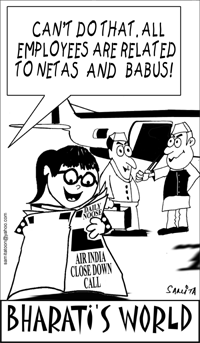Despite loud proclamations about liberalisation of Indian education, in the southern sea-board state of Tamil Nadu (pop. 62 million), the ruling DMK government seems hell-bent on extending its control over the state’s private schools whose excellent academic standards are proving an embarrassment to dysfunctional state and local government schools. In particular, it seems determined to control the state’s 5,934 private unaided Matriculation schools whose students routinely top the class X and XII school-leaving exams of the Tamil Nadu State Examinations Board (TNSEB), which has 52,303 government and aided, and 5,934 private unaided schools affiliated with it.
In January, the state legislative assembly passed the Uniform System of School Education Act, 2010 which decreed a common curriculum for all schools affiliated with TNSEB. Under this Act, the separate Directorate of Matriculation Board was abolished and all TNSEB affiliated schools were directed to closely follow the board’s prescribed curriculum and textbooks.
Now, under the Tamil Nadu Schools (Regulation of Collection of Fee) Act 2009, on May 7 the state government decreed a new fee structure applicable to 5,934 private unaided Matriculation schools and 5,000 private nursery and primary schools affiliated with the Directorate of Elementary Education of Tamil Nadu. Primary-secondaries affiliated with the Central Board of Secondary Education (CBSE) and the Council for the Indian School Certificate Examination (CISCE) are specially exempt. The state government-imposed fee structure was prompted by parental complaints and media reports about the exorbitant fees being charged by some private unaided schools, according to education ministry sources.
 The new tuition fee structure finalised by a Private Schools Fee Determination Committee — a statutory panel appointed by the state government and headed by Justice K. Govindarajan — has provoked an anguished outcry from the managements of all the 10,934 private unaided Matricu-lation, private nursery and primary schools. The committee has stipulated a maximum tuition fee of Rs.11,000 per annum for private higher secondary schools, Rs.9,000 for high schools, Rs.8,000 for middle schools and Rs.5,000 for elementary schools statewide. In rural Tamil Nadu the maximum permissible tuition fee for private elementaries is Rs.3,500 per year.
The new tuition fee structure finalised by a Private Schools Fee Determination Committee — a statutory panel appointed by the state government and headed by Justice K. Govindarajan — has provoked an anguished outcry from the managements of all the 10,934 private unaided Matricu-lation, private nursery and primary schools. The committee has stipulated a maximum tuition fee of Rs.11,000 per annum for private higher secondary schools, Rs.9,000 for high schools, Rs.8,000 for middle schools and Rs.5,000 for elementary schools statewide. In rural Tamil Nadu the maximum permissible tuition fee for private elementaries is Rs.3,500 per year.
According to the committee, it imposed the tuition fee ceilings after collecting basic information from schools statewide on average fees levied, student strength, teachers’ salaries and other expenses. The committee has also notified that the tuition fee ceilings imposed by it are valid for three years and any breach will lead to stringent government action against erring schools.
While inevitably and myopically the parents’ community has welcomed the imposition of tuition fee ceiling for all TNSEB affiliated schools, the great majority of private Matriculation, nursery and primary school manage-ments are shocked and disappointed.
“The fee ceiling imposed by the committee is 50 percent of our current tuition fee. The questionnaire sent to schools only asked for basic information regarding infrastructure, student strength, fee structure, and remuneration of teachers. In our school, we raise teachers’ pay by 35 percent annually, and we have also taken huge loans for infrastructure development. Recently we have introduced ICT pedagogies such as SmartClass and encourage students to enter pan-India talent contests. We will be forced to withdraw these initiatives if the new fee ceiling is imposed. The committee has arbitrarily decreed the fee ceiling without inspecting each school and ascertaining the quality of education provided,” says R. J. Bhuvanesh, CEO of the Kaligi Ranganathan Montford Matriculation Higher Secondary School which has an aggregate enrolment of 4,400 students instructed by 230 teachers.
Unsurprisingly, following the passage of the TN School (Regulation of Collection of Fee) Act 2009, the Tamil Nadu Nursery, Matriculation and Higher Secondary Schools Association (TNNMHSSA) filed a petition in the Madras high court. However, on April 9 the court upheld the validity of the Act on the ground that it was in consonance with the law laid down by the Supreme Court in the Islamic Academy Case (2003) which allows government to balance institut-ional autonomy with reasonable measures taken to prevent commercial-isation of education. To compound the misery of private schools banded under TNNMHSSA, on May 10 the Supreme Court upheld the judgement of the Madras high court stating that each school is free to petition the Govind-arajan Committee for revision of the ceiling imposed in its own case.
“If the new fee structure is enforced we will have to reduce the salaries of teachers, do away with the 50-100 percent fee waiver that we provide underprivileged students and scholar-ships we give to meritorious students who excel in extra-curricular activities,” warns B. Raghupathi, principal of the Velammal Matriculation Higher Secondary School.
That’s a warning unlikely to stir the conscience of the ruling DMK family hell-bent upon mixing profitable controls with political populism.
Hemalatha Raghupathi (Chennai)